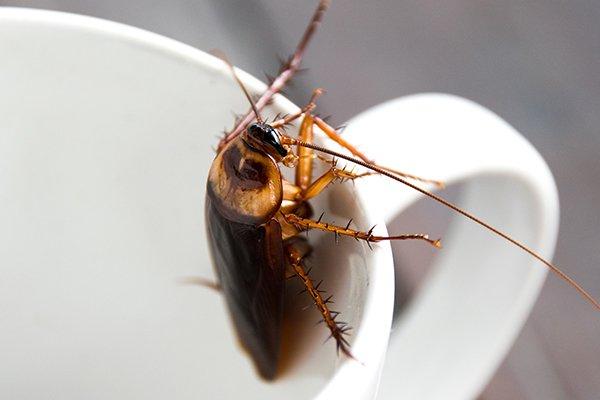On this website, some posts contain affiliate links, which means that if you buy a product using my link, I may earn a commission.
To control pests in the kitchen, keep your kitchen clean by wiping down surfaces and sweeping the floors regularly. Pay attention to areas where moisture may be present, such as leaking pipes or clogged drains, and eliminate them to prevent pests from appearing.
Additionally, seal cracks and crevices in and around the kitchen to prevent pests from entering. Use home remedies like placing apple cider vinegar in a bowl or glass with plastic wrap and holes poked in it to attract and trap pests.
Regularly clean and scrub your kitchen to eliminate any infestations. By following these steps, you can effectively control and prevent pests in your kitchen.
Importance Of A Pest-free Kitchen
To prevent pests in the kitchen, maintain a clean environment by wiping down countertops, tables, and sinks regularly. Sweep the floors to remove crumbs and food debris. Additionally, seal any cracks or crevices and fix any leaking pipes or clogged drains to eliminate moisture sites that attract pests.
The Impact Of Pests On Kitchen Hygiene
Keeping your kitchen pest-free is crucial for maintaining a hygienic and safe environment. Kitchen pests can pose health risks as they contaminate food and surfaces with their feces, urine, and saliva. These pests can spread diseases such as salmonella, E. coli, and dysentery. In addition, pests like cockroaches, rodents, and ants can cause damage to your kitchen by gnawing on food packaging, electrical wires, and even wood structures. To prevent kitchen pests, it is important to keep your kitchen clean and free of any food or liquid spills. Wipe down countertops, sinks, and tables regularly to eliminate attractants for pests. Additionally, sealing cracks and crevices, fixing any leaky pipes, and storing food in airtight containers can help prevent pests from entering your kitchen. Regular inspections and professional pest control treatments can also be effective measures to control and eliminate kitchen pests. |
Preventive Measures
To control pests in the kitchen, it is important to keep the area clean and free of crumbs and spills. Wiping down counters after each use and cleaning up any food or liquid thoroughly is essential. Additionally, sealing cracks and crevices and eliminating moisture sources can help prevent pests from appearing.
| Preventive Measures | |
| Keeping the kitchen clean and tidy | The first and foremost thing that you can do to keep your kitchen pest-free is keeping it clean. Wipe down the kitchen table, sinks, and countertops, and keep the surfaces as clean as possible. Also, sweep the floors to eliminate any crumbs. |
| Sealing entry points for pests | To prevent pests from entering your kitchen, make sure to seal any cracks and crevices on the outside of your home and around the kitchen. This will help block their entry points and reduce the chances of infestation. |
| Removing sources of food and water for pests | Eliminate all moisture sites, including leaking pipes and clogged drains. Additionally, clean up food and liquid spills immediately to remove any sources of food and water that can attract pests. |
Natural Pest Control Methods
Pour a small amount of apple cider vinegar into a bowl or glass, cover it with plastic wrap (use a rubber band to keep it tight), and poke holes in the plastic wrap. The sweet smell of the vinegar will attract pests like fruit flies and gnats, and they will get trapped inside the bowl. Empty and clean the bowl regularly to get rid of the trapped pests.
Certain essential oils and herbs have strong scents that repel pests. For example, peppermint oil and cloves can deter ants and spiders. Place a few drops of peppermint oil or sprinkle ground cloves in areas where pests are likely to enter, such as cracks and crevices. Alternatively, you can create a homemade pest-repellent spray by mixing essential oils with water and spraying it around the kitchen.
There are non-toxic pest control sprays and powders available in the market that are safe to use in the kitchen. Look for products that use natural ingredients like pyrethrum, which is derived from chrysanthemum flowers. These sprays and powders can effectively kill insects without posing any harm to humans or pets. Follow the instructions on the product packaging for proper application and use.


Credit: www.getmypests.com
Common Kitchen Pests And How To Deal With Them
Keep your kitchen pest-free by regularly cleaning and scrubbing surfaces, wiping down counters after cooking, and eliminating all moisture sites like leaking pipes. Seal cracks and crevices around your kitchen and keep floors free of crumbs. Maintain a clean and tidy environment to prevent pests from appearing in your kitchen.
AntsIdentifying ant trails and entry points: Look for lines of ants and trace them back to their entry points, typically cracks or gaps in walls or windows. Using deterrents and natural ant baits: Deploy ant deterrents like cinnamon or vinegar along their trails. Use natural ant baits made of sugar and borax to attract and eliminate them. |
CockroachesRecognizing signs of cockroach infestation: Look for cockroach droppings, egg cases, and a musty odor that indicates their presence. Applying chemical or natural cockroach control methods: Use insecticide sprays, baits, or traps to eliminate them. Opt for natural methods like boric acid or diatomaceous earth if preferred. |
Fruit fliesEliminating fruit fly breeding grounds: Clean up spilled or rotting fruits, dispose of overripe produce, and regularly empty and clean trash bins. Making homemade fruit fly traps: Use apple cider vinegar or a dish soap and water mixture in a bowl covered with plastic wrap, with tiny holes poked through to trap the fruit flies. |
Professional Pest Control Services
|
When it comes to controlling pests in the kitchen, it is important to consider professional help. Hiring a reputable pest control company can provide the expertise and resources needed to effectively eliminate pests. There are certain situations when professional help should be considered. If the infestation is severe, recurring, or difficult to control on your own, it is best to seek professional assistance. Choosing a reputable pest control company is essential. Look for companies with proper licenses, certifications, and positive reviews. Additionally, consider their experience and knowledge in handling kitchen pests specifically. Understanding different pest control methods and treatments is also important. A professional pest control company will have access to a wide range of effective techniques to target specific pests in the kitchen. They will also be able to provide advice on preventive measures to avoid future infestations. |
Maintaining A Pest-free Kitchen
Maintaining a pest-free kitchen is crucial for a clean and healthy environment. To control pests in the kitchen, regularly clean and scrub all surfaces, wipe down counters, and eliminate any moisture sites. Additionally, seal cracks and crevices to prevent pests from entering the space.
Regular Cleaning And Maintenance Routines
Cleaning food and liquid is the best way to prevent pests from appearing in your kitchen. Wipe down counters after every time you cook. Be sure to clean up each and every crumb you can see. Sweep the floors if you don’t have a pet to help you with the crumbs in your kitchen.
Periodic Pest Inspections And Preventive Measures
Eliminate all moisture sites, including leaking pipes and clogged drains. Seal cracks and crevices on the outside of the home and around the kitchen, especially. Keep the surfaces as clean as possible. Engage in proper waste management practices.
Engaging In Proper Waste Management Practices
Keep your kitchen clean by wiping down the kitchen table, sinks, and countertops regularly. Additionally, sweep the floors to remove any crumbs that might attract pests. By following these regular cleaning and maintenance routines, you can help prevent kitchen pests from infesting your space.
Frequently Asked Questions For How To Control Pests In The Kitchen
What Is The Best Way To Control Pest In The Kitchen?
The best way to control pests in the kitchen is to keep it clean. Wipe down all surfaces, including countertops and sinks, and sweep the floors regularly. Eliminate moisture sites like leaking pipes and clogged drains. Seal cracks and crevices in your kitchen and the outside of your home.
Additionally, using apple cider vinegar traps can help catch and reduce pests.
What Is The Most Effective Way Of Keeping Your Kitchen Pest Free?
The most effective way to keep your kitchen pest free is to keep it clean. Wipe down surfaces, sweep the floors, and eliminate any food or liquid spills. Seal cracks and crevices, fix leaking pipes, and clean up any standing water.
Additionally, you can use home remedies like apple cider vinegar to trap pests.
What Home Remedy Is Good For Kitchen Bugs?
To get rid of kitchen bugs, try this home remedy: Mix apple cider vinegar with some dish soap and water in a bowl. Place plastic wrap over the bowl and secure it with a rubber band. Poke small holes in the plastic wrap.
Bugs will be attracted to the vinegar and get trapped.
How Do You Get Rid Of Indoor Pests?
To get rid of indoor pests, make sure to keep your kitchen clean by wiping down surfaces and sweeping the floors regularly. Eliminate moisture sites and seal any cracks or crevices. Use apple cider vinegar in a bowl or glass with plastic wrap and holes poked in it to attract and trap pests.
Conclusion
To effectively control pests in your kitchen, it is crucial to keep your kitchen clean and free from food and liquid residue. Regularly wipe down countertops, tables, and sinks, and sweep the floors to eliminate any crumbs that may attract pests.
Additionally, eliminate all sources of moisture such as leaking pipes and clogged drains, as pests are attracted to moisture. Seal cracks and crevices around your kitchen to prevent pests from entering. By following these practices, you can create a pest-free environment in your kitchen and ensure the safety of your food and health.
On this website, some posts contain affiliate links, which means that if you buy a product using my link, I may earn a commission.

